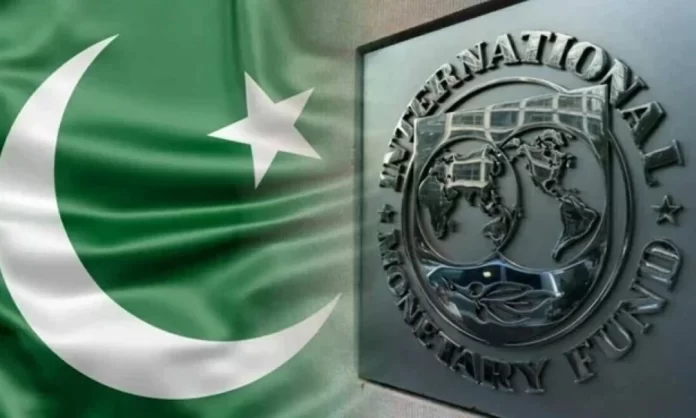ISLAMABAD: The International Monetary Fund (IMF) has released a damning report on Pakistan’s governance and corruption issues, detailing the significant challenges the country faces in tackling elite capture and systemic corruption across key sectors.
According to the IMF report, Pakistan’s corruption recovery efforts have yielded Rs5.31 trillion between January 2023 and December 2024, but this figure represents only a fraction of the total cost of corruption. The IMF notes that such recoveries are just one way to measure the economic toll of corruption, as there is no reliable method to quantify the full scale of the issue.
According to the IMF’s Pakistan Governance and Corruption Diagnostic Assessment, if governance reforms are successfully implemented, Pakistan could see a 5% to 6.5% increase in GDP over the next five years.
The IMF report, published on the Finance Division website, outlines how entrenched interests in sectors like sugar, real estate, agriculture, and energy have perpetuated corruption, undermining Pakistan’s reform efforts. One of the most striking findings of the report is the staggering figure of Rs5.31 trillion recovered from corruption-related assets over two years (January 2023 to December 2024). However, the IMF cautions that these recoveries represent just a fraction of the broader economic impact of corruption, which remains pervasive and largely unchecked.
Elite Capture in Key Sectors
The IMF identifies elite capture as a central issue, where powerful, wealthy, or politically connected groups manipulate public policies and resources for their own gain. The report provides the sugar sector as a textbook example of this phenomenon. It explains how sugar mill owners, many of whom hold influential political positions, have long influenced government policies in their favor. These firms have benefited from favorable pricing, protective tariffs, subsidies, and export incentives at the expense of consumers and market competition. In particular, the 2018-19 decision to allow significant sugar exports, even subsidizing them, led to domestic shortages and soaring prices.
Beyond the sugar industry, the IMF highlights how favorable tax exemptions for sectors like real estate, manufacturing, and energy have eroded government revenues. Agricultural income, until recently, was not taxed, and industries such as real estate continue to benefit from preferential tax arrangements. The IMF estimates that tax expenditures in these sectors amounted to 4.61% of GDP in FY 2023, contributing significantly to Pakistan’s fiscal deficit and undermining the country’s tax-to-GDP ratio.
The IMF further notes that Pakistan’s economic elite has consolidated power through land ownership, a legacy of colonial policies. Following independence, landowners continued to dominate the political economy, entrenching their influence over time. The IMF cites a 2020 UNDP report which estimated that elite privileges, including subsidies and tax reliefs, amounted to $4.7 billion for the corporate sector alone. These privileges have exacerbated inequality and limited the potential for broader economic growth.
Corruption Risks in the Judicial Sector
The report also outlines significant weaknesses in Pakistan’s judicial system, describing it as one of the most corrupt state functions. Public surveys consistently rank the judiciary as highly corrupt, with inefficiencies in enforcing contracts and protecting property rights further entrenching corruption risks. The IMF cites the backlog of over two million cases in Pakistan’s courts, which hampers the ability of businesses and individuals to rely on the legal system for resolving disputes. The IMF urges reforms to enhance judicial independence, improve performance oversight, and establish clearer, more transparent mechanisms for judicial accountability.
Macroeconomic Consequences
The IMF stresses that corruption is a major drag on Pakistan’s economic development. It notes that governance weaknesses—such as flaws in budgeting, fiscal reporting, public procurement, and the management of state-owned enterprises—undermine public trust and reduce the effectiveness of public spending. The report further emphasizes that corruption in these areas raises the cost of doing business, discourages foreign investment, and hampers economic growth.
A Path to Economic Growth
The IMF’s report concludes with a strong call for governance reforms, stating that eliminating corruption could result in an estimated 5% to 6.5% boost to Pakistan’s GDP over the next five years. Such reforms would include addressing fiscal weaknesses, simplifying the tax system, improving transparency in public procurement, and overhauling the management of state-owned enterprises. Strengthening the legal system to ensure contract enforcement and protect property rights would also be crucial for reducing corruption risks.
Despite the IMF’s warnings, Pakistan has made some progress in its fight against corruption. The country recently succeeded in being removed from the Financial Action Task Force’s (FATF) grey list, and some strides have been made in anti-money laundering reforms. However, the IMF report underscores that much more work is needed to address the low rate of corruption-related convictions and to improve the transparency and accountability of financial institutions.
In conclusion, the IMF’s assessment highlights the critical need for structural reforms to address corruption, strengthen governance, and foster a more equitable economic environment in Pakistan. Without such reforms, the country’s economic stabilisation efforts risk being undermined by vested interests that continue to hold disproportionate influence over key sectors.
























